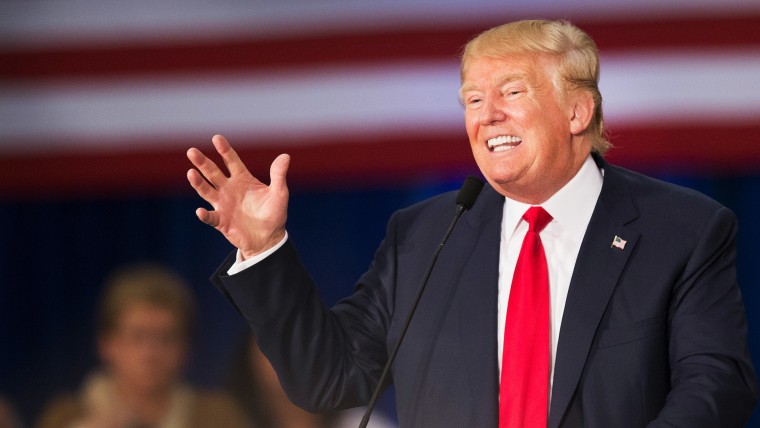No matter what someone may think about Donald Trump, it's hard to deny his limitless self-confidence. Put aside what the Republican presidential candidate is saying, focusing on how he's saying it, and we see a White House hopeful who exudes self-assuredness.
If you're turned off by bluster, it's obnoxious. If you find bluster reassuring, it's infectious. Right about now, nearly a third of national Republican primary voters find themselves in the latter camp.
But in very rare occasions, Trump's veneer fades. The Washington Post reported overnight:
Donald Trump, leading in the polls and riding a wave of momentum in the race for the Republican presidential nomination, just hit a speed bump named Hugh Hewitt. The conservative radio host peppered Trump with a host of foreign policy questions in a Thursday interview that produced some uncomfortable moments for the real estate mogul, who appeared upset at the line of questioning.
Hewitt, a prominent figure in conservative media and one of the moderators of an upcoming GOP debate, posted the transcript and it's not a pretty sight. Trump, eager to sound like he knew what he was talking about, tried to fake his way through parts of the interview, but that only seemed to make matters worse.
Note, for example, when the host asked about the Quds Forces, and Trump responded by talking about the Kurds. The candidate added that he'll know the difference between Hezbollah and Hamas "when it's appropriate," suggesting it's not appropriate to know the difference now.
At one point, Trump insisted, "I mean, you know, when you're asking me about who's running this, this this, that's not, that is not, I will be so good at the military, your head will spin." (He often seems preoccupied with spinning heads. It's a little alarming.)
Towards the end of the interview, the GOP frontrunner called the line of questioning "ridiculous" -- four times -- and this morning, Trump told MSNBC that Hewitt is a "third-rate radio announcer."
The broader question is whether an embarrassing moment like this represents an important setback for the candidate. Recent history offers some guidance.
If the conventional wisdom is accurate, and Americans look at the Republican Party as the dominant party on matters of foreign policy, Trump's obvious display of ignorance might seem like a development that would cost his campaign real support.
The problem, of course, is that the perceptions about the GOP and its signature issues are wrong.
Around 16 years ago at this time, then-Gov. George W. Bush struggled badly, more than once with questions similar to the ones Trump flubbed yesterday. (At one point, for example, the Texas Republican referred to people from Greece as "Greecians.") GOP voters couldn't have cared less.
In the 2008 presidential race, Sen. John McCain (R-Ariz.) made foreign policy his signature issue, and yet the senator said he thought Iraq and Pakistan share a border; he said Czechoslovakia is still a country; he got confused about the difference between Sudan and Somalia. he got confused about how many U.S. troops were in Iraq; and he got confused about Iran's relationship with al Qaeda.
In the 2012 cycle, Mitt Romney's understanding of international affairs was so pathetically superficial that Thomas Friedman said the Republican acts "as if he learned his foreign policy at the International House of Pancakes."
But in each instance, the media generally didn't care and GOP voters were willing to look the other way.
Trump was woefully unimpressive in the Hewitt interview, but it's a safe bet that it won't change a single vote.
